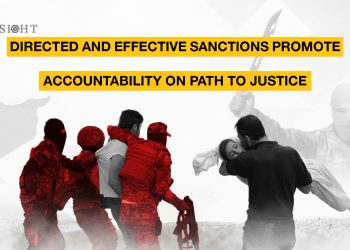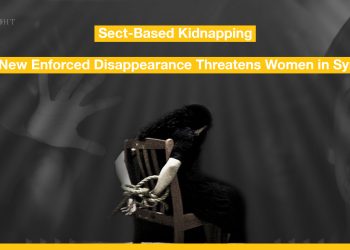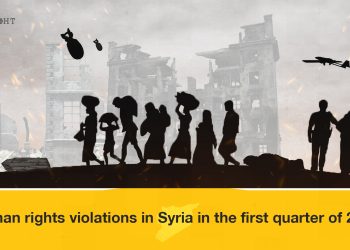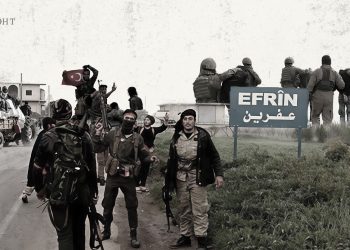Introduction:
INSIGHT recorded the human rights violations against civilians in Syria in last December of 2024, the last days of Bashar al-Assad regime and the following weeks, which witnessed violations and continued Turkish and Israeli shelling in several areas, as well as continued hostilities in north Syria, despite the messages from the parties to the conflict that renounce violence and violations and call for dialogue to build a new Syria.
For the purpose of preparing this report, INSIGHT monitoring team conducted open-source research and contacts with direct and active field sources to prepare the data that the report was based on.
The team also used documentation materials collected for the preparation of thematic reports, along with reports and appeals by other local organizations.
Gathering the data lasted from December 1st of 2024 to January 1st of 2025, while data verification continued for extra days.
The numbers are greater than what our team has gathered, though they show violations of killing and injury by the parties to the conflict, and extrajudicial detention, which also threatens to expose some victims to torture and degrading practices, as well as the status of ISIS activity.
Civilian casualties
INSIGHT monitored the killing and injury of 297 civilians in hostilities by the parties to the conflict, (159 were killed and 138 injured), given the continuing non-discrimination between military objectives and civilian objects, and the spread of reprisals amid the lack of clear transitional justice mechanisms.
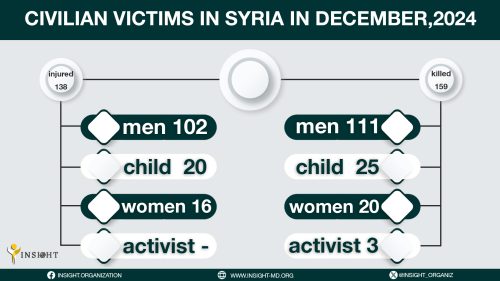
Causes of civilian casualties
Engagements and aerial and artillery shelling continued in Syria in last December. During the military and security operations, the parties to the conflict killed, attacked and arrested civilian Syrians. ISIS carried out attacks. Turkey, Israel and Russia also targeted from outside or within the border areas of Syria, killing and injuring civilians.
Direct targeting with weapons caused the higher civilian casualties, followed by shelling, and then the explosion of war remnants.
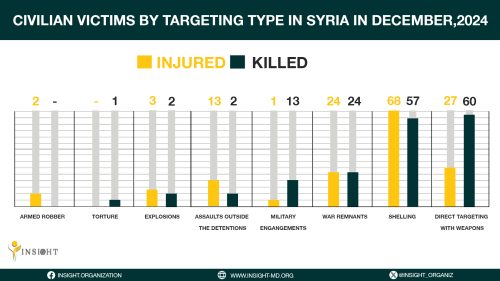
The conflict was ended in vast areas in Syria since December 7, though hostilities or tensions continued in other areas in the north and south. States of Turkey and Israel also continued shelling and attacking, following the withdrawal of two major actors, Iran and Russia.
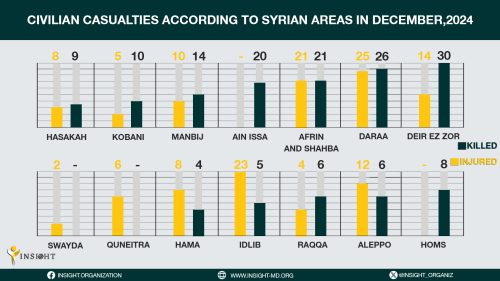
Foreign forces shelling
During the first week of December,2024, Russian and Assad regime forces bombed 20 positions, killing 15 civilians, 14 men and 1 woman, and injuring 44 civilian men, and causing military casualties.
The targeted sites were: 9 sites in Idlib, 6 in Aleppo, 3 in Hama and 1 in Daraa and 1 in Deir ez-Zor.
During December,2024, the Global Coalition targeted 16 ISIS, pro-Iranian factions, and government forces sites in Deir ez-Zor with airstrikes, no civilian casualties were recorded.
Israel shelled 31 sites of government forces with airstrikes. It continued shelling after the fall of the Assad regime, killing 2 civilian men and injuring 2 civilian men, there were military casualties, too.
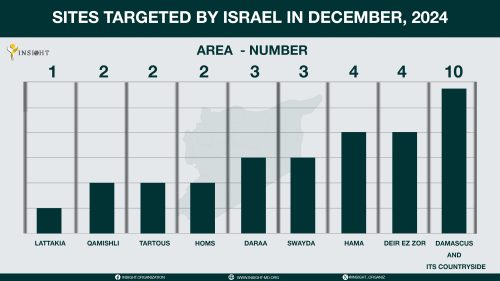
In the same month, Turkish forces shelled at least 197 sites in north Syrian with missiles and drones.
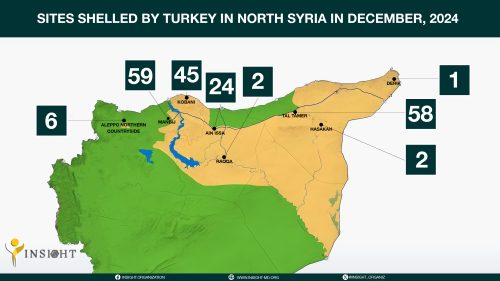
Turkish strikes killed 40 civilians and injured 22 civilians, in addition to military casualties.
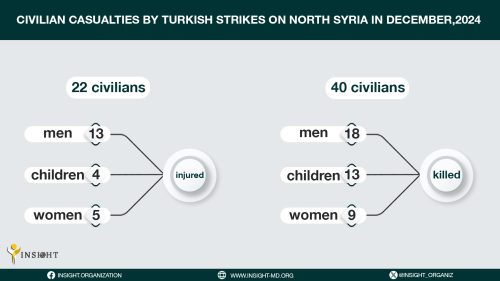
Aircraft, that we could not determine to which party they belonged exactly, targeted 14 pro-Iranian factions’ sites in Deir ez-Zor and its countryside.
ISIS
During December of 2024, ISIS members carried out at least 21 attacks, killing 18 civilian men, 11 SDF soldiers, and injuring 2 civilians (a man and a woman) and 4 SDF soldiers.
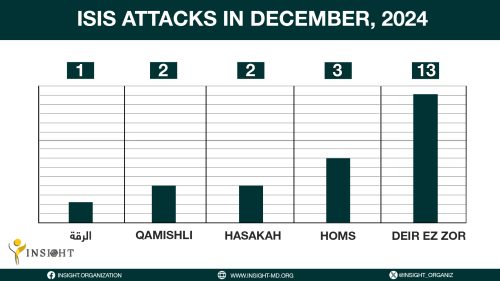
ISIS members were targeted by 8 security operations in Deir ez-Zor and Raqqa, 3 by the SDF, 1 by joint SDF-Global Coalition operation, and 4 airstrikes by the Global Coalition.
Security operations against ISIS resulted in the killing of 15 members at least and the arrest of 50 others.
Arrest and other violations
Parties to the conflict in Syria arrested at least 252 civilians, including 8 women, during December,2024.
The accusations were, as in previous months, loyalty to a hostile party, irregular crossing of borders and areas of influence, or not paying the loyalty imposed by military factions.
After the fall of the Assad regime, many of the prisoners gained their freedom back, Syrian refugees returned to their original homes, and others returned from neighboring countries.
However, the new authorities have not taken clear action to collect and protect evidence, including official records in prisons, security branches and mass graves, despite their importance in uncovering the fate of tens of thousands of missing persons and holding those responsible for crimes committed inside and outside detentions.
In Manbij, north Syria, the fighting continued between the Syrian Democratic Forces (SDF) and pro-Turkish “Syrian National Army” factions. There was an exodus from the northern countryside of Aleppo towards east Euphrates and the cities of Aleppo and Afrin.
Violations in the aforementioned areas did not stop, despite the contacts between all the armed parties to the conflict.
Videos were spread on social media of attacks on religious and social sacred places, and other of innocent people allegedly subjected to reprisals. Until now, no clear mechanism for holding leaders of the former regime accountable for their crimes, has been available.
Reactions to, certain statements that included limiting freedoms of women’s rights and components, showed the determination of Syrians to build a state that respect the human rights and freedom for which they had sacrificed.
Turkey’s and Israel’s intervention in Syrian territory continues, threatening to undermine the hopes of stability that Syrians, the caretaker Government and other representatives of the Syrian people aspire to.
We, INSIGHT, urge all parties to end military actions and allow displaced persons from all regions to return to their homes. Then we call them to launch a path for justice that guarantees fair accountability under the law for perpetrators of violations of the previous regime as well as parties to the conflict, away from reprisals that threaten the stability of the communities. The International Commission of Inquiry on Syria and the Impartial International Mechanism can support such efforts.
The families and relatives of persons who are forcibly missing, have the absolute right know the fate of their forcibly disappeared family members. And for this purpose, the Transitional Government and all parties should benefit from the United Nations Private Independent Missing Persons Institution headed by Carla Quintana.
We call on all Syrians to dialogue to build their country by upholding the fundamental rights and freedoms of all communities without discrimination, protecting peaceful means of protest such as the right to gather and demonstrate, and preventing further violations like targeting with weapons, arrests or any form of repression and intimidation.


